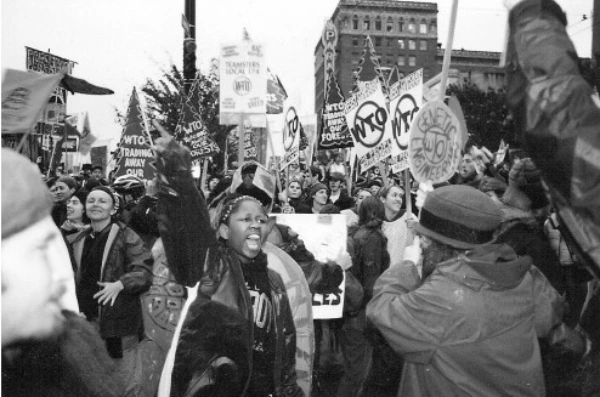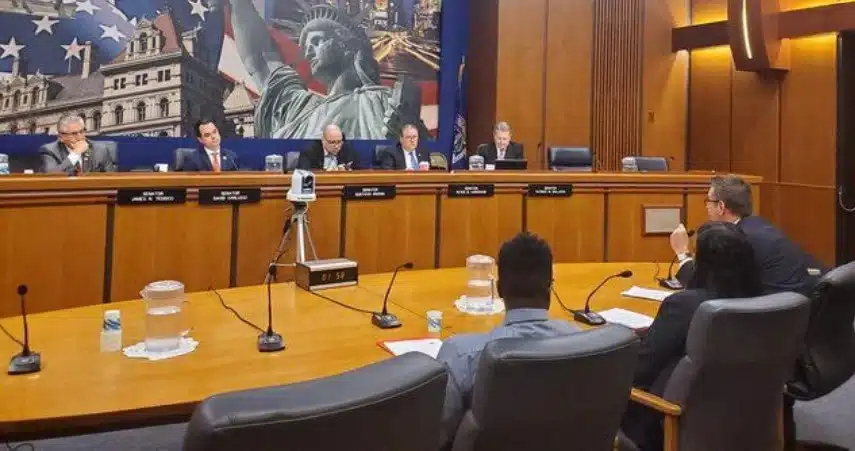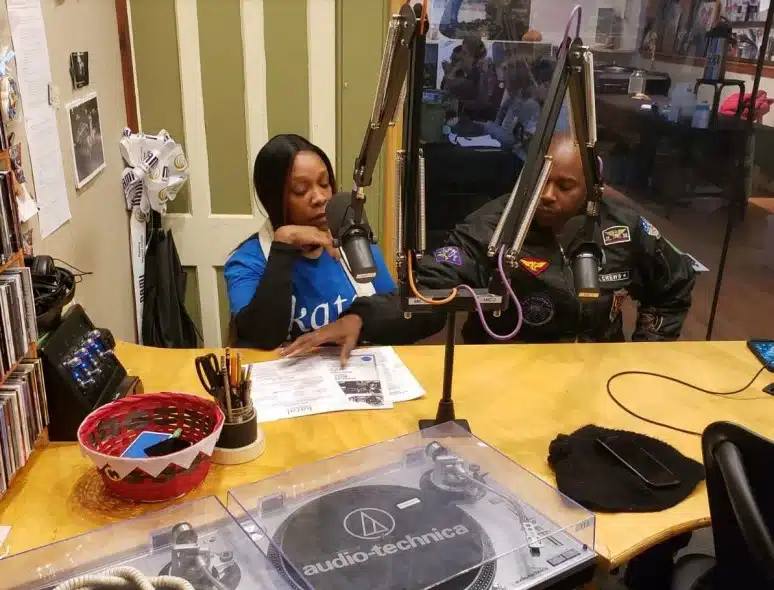In this issue…

#ShutDownWTO20: An Organizers’ History of the WTO Shutdown in 1999
In Albany: Rallying to End Overdose and Save Lives in NYS
Katal talks #LessIsMoreNY on WOOC 105.3 FM the Sanctuary for Independent Media
#ShutDownWTO20: An Organizers’ History of the WTO Shutdown in 1999
Tens of thousands of people joined the nonviolent direct action blockade that encircled the WTO conference site, completely preventing conference meetings from dawn till dusk.
“Today’s movements have centuries of organizing history to draw from. The 1999 WTO Shutdown is one of many movement turning points to analyze and understand. We are proud to offer our experiences and reflections in that spirit.”—#ShutDownWTO20 project organizers
This year marks the 20th anniversary of the World Trade Organization (WTO) protests in Seattle, which raised awareness in the United States about the profound problems of corporate globalization while energizing freedom movements around the world. A new project launched this week—#ShutDownWTO20: An Organizers’ History of the World Trade Organization Shutdown in 1999—provides stories, archival material, and new analysis to reflect on this critical moment in movement history.
From November 29 – December 3, 1999, more than 80,000 people joined a public uprising against the WTO, transforming downtown Seattle into a “festival of resistance.” Tens of thousands participated in using nonviolent direct action tactics to blockade the WTO conference site, shutting down the conference proceedings. Activists, organizers, artists, community members, workers, and others held the blockade in the face of an army of local, state, and federal police who used not only rubber, plastic, and wooden bullets, but pepper spray, tear gas, concussion grenades, armored vehicles, and mass arrests in their attempts to stop the protests.

Seattle Police attacking peaceful protestors, WTO Protests ( 1999) Photo credit: Seattle Post-Intelligencer
Katal co-founder gabriel sayegh was on the ground in Seattle in 1999, working as one of the direct action organizers and a core member of the logistics team for the mass mobilization.
As noted by the #ShutDownWTO20 project organizers, “An essential method of dismantling social movements is to erase our shared history of collective action. We have a responsibility to remember, to learn from our successes and mistakes, and to contribute our lessons from Seattle 1999 to today’s movements for social, economic, racial, and gender justice across the globe. Organizers need guidebooks from our experiences, and Seattle provides lessons in mass organizing, direct action, strategy, and counter-movement backlash.” The #ShutDownWTO20 project presents materials from the protest organizing histories and reflections about the diverse impacts of these demonstrations.
You can find these resources and others online:
- a short op-ed about the project, and a short video about the protests;
- movement reflections;
- a fantastic organizers’ history of the five days of actions by #ShutDownWTO20 project member Chris Dixon;
- the broadsheet organizers used for outreach and the Mass Nonviolent Direct Action toolkit;
- a collection of movement histories featuring essays, books, and films;
- art and videos from the actions; and
- a section on what’s next, including an interview with organizers and about the next 20 years.
The #ShutDownWTO20 project also includes a few pieces from gabriel, produced during that period. gabriel co-edited the WTO Logistics Zine (2000), a guide for mass action logistics and convergences; and he authored the essay “Redefining Success: White Contradictions in the Anti-Globalization Movement” (2001).
Katal thanks the organizers of the #ShutDownWTO20 project and encourages you to check out these resources to learn more about movement history!
In Albany: Rallying to End Overdose and Save Lives in NYS
Katal Leader Ron Anderson addressing rally participants about the importance of treatment for substance use disorders at the Legislative Office Building.
Last Friday, November 15, we were back at the state capitol in Albany, rallying with our allies to demand immediate state action on the overdose crisis. Then we went to testify at NYS Senate Opioids, Addiction & Overdose Prevention Joint-Task Force hearing. Speakers urged the Task Force to rapidly increase funding for harm reduction services across the State- specifically in rural areas; provide universal access to medication-assisted treatment; expand supportive housing; implement safer consumption spaces; and the decriminalization of drug possession. Speakers, including Katal leader Ron Anderson (pictured above), highlighted their frustrations about the Governor’s inaction on implementing these lifesaving interventions, underfunding the state’s response to this devastating crisis, and the administration’s lack of compassion for their loved ones.

Keith Brown addresses the NYS Senate’s Opioid, Addiction & Overdose Task Force.
“We have to decriminalize substance use disorder and invest in health, housing, and things we know work. Increased penalties and increased enforcement does not lead to reductions in drug use,” said Keith Brown, capping his last day with Katal.
Read our full press release at this link.
Follow the #EndOverdoseNY hashtag on twitter to see photos and clips from Friday’s actions.
Katal talks #LessIsMoreNY on WOOC 105.3 FM the Sanctuary for Independent Media


Katal Leader Tara Cobbins, alongside NY Community Organizer Cedric Fulton, join the WOOC 105.3 team for a conversation on #LessIsMoreNY.
Tuesday, November 19, Katal Leader Tara Cobbins, alongside Community Organizer Cedric Fulton, joined WOOC 105.3 The Sanctuary for Independent Media for a conversation on our parole reform legislation, #LessIsMoreNY. New York reincarnates more people for technical violations of parole than any state in the nation except Illinois. Reincarnating people for technical violations makes it exceedingly difficult for people to successfully rejoin their communities, families, and jobs when they are released from prison. And these practices particularly harm Black and brown communities. In the WOOC 105.3 interview, Tara, who is currently on parole, discussed her experience navigating the parole system and the ways in which it negatively impacts her life as the mother of a 12-year-old.
Our #LessIsMoreNY Act would fix this mess in New York, strengthen public safety, and support effective re-entry for people coming home from prison. Through the passage of this bill, we can shrink jail and prison population in New York State, and Albany must take action now.
Listen to the full #LessIsMoreNY episode at this link.
If you’d like to join us for upcoming #LessIsMoreNY actions or to host a teach-in about this legislation in your community, contact Cedric Fulton at cfulton@katalcenter.org or at 518.965.6771 for more details and to RSVP.

